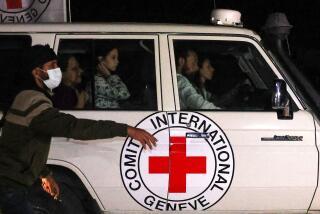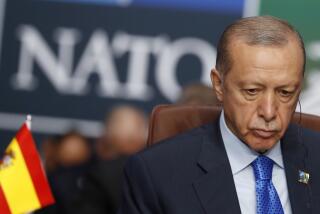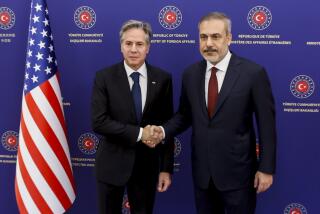Biden seeks Turkey’s patience as U.S. decides whether to extradite cleric sought in coup attempt
Vice President Joe Biden on Wednesday likened the July 15 coup attempt in Turkey to the Sept. 11, 2001, attacks in the U.S., and urged patience as the U.S. determines whether to extradite a cleric Turkey blames for the uprising.
The extradition of Fethullah Gulen, who lives in self-exile in Pennsylvania since leaving Turkey more than a decade ago, has become a bitter point of contention amid the Ankara government’s repeated demands for the cleric to be handed over.
Biden reiterated the U.S. position that proper legal procedures must be followed before any decision can be made regarding extradition.
“What possible motive could we have to harbor a terrorist?” Biden said after a meeting at the presidential palace in Ankara with President Recep Tayyip Erdogan, who sat stern-faced alongside him during a briefing with reporters. “We have no reason to shelter a strongman who would attack ... and try to overthrow a democracy.”
Erdogan seemed to lecture Biden, who at times looked weary and placed his forehead in his hands.
The Turkish president again demanded Gulen’s extradition “as soon as possible” and urged that the cleric be placed in provisional detention.
“He’s still giving interviews to media outlets,” Erdogan said. “That’s why pretrial detention is important and I feel I need to remind you of it. I’m confident the U.S. will take the right steps.”
This was never going to be an easy trip for Biden, the highest-ranking Obama administration official to visit Turkey since the failed coup, in which nearly 300 people were killed. In a day of meetings with senior Turkish leadership, he repeatedly sought to ease heated tensions between the allied nations and reassure the Turks of U.S. solidarity.
“Can you imagine if this happened at home? Can you imagine what the American public would be saying?” Biden said earlier in the day as he scrambled solemnly through the twisted, rubble-strewn wreckage of Turkey’s parliament building, bombed by a mutinous military unit during the attempted coup.
Biden was accompanied by parliament Speaker Ismail Kahraman and alluded to the Sept. 11 jet that crashed in Pennsylvania but was apparently destined for the U.S. Capitol.
Anti-U.S. sentiment has been widespread in Turkey since the failed putsch, in large part over Gulen. Biden repeatedly explained that an extradition must meet a set of legal standards in a court of law, and that not even President Obama can change the process.
U.S. officials said this week that they have accepted for consideration an extradition request on Gulen but that it involves alleged crimes that predate the coup attempt. A team of Department of Justice investigators is in Turkey to further review evidence.
Turkish officials this month delivered four dossiers against Gulen asking for his extradition under a 1981 treaty. The files include indictments and arrest warrants issued for Gulen by judges in Istanbul, Bursa and Ankara, who accuse Erdogan’s former ally of aggravated fraud, forgery of official documents, embezzlement and violation of privacy rights. The requests total more than 3,000 pages, Turkish officials said.
Gulen has denied wrongdoing.
On the roads in Ankara, protesters greeted Biden’s convoy with placards reading, “What if [Osama] bin Laden would be in Turkey and we didn’t give him to you after 9/11?”
The U.S. has found itself vilified in the Turkish press recently, with several newspapers accusing the the CIA of being behind the episode, noting that Gulen’s application for permanent residency was supported by letters from former senior American intelligence officials.
“Never have bilateral ties been this frayed, never have ordinary Turks been this disillusioned in the history of Turkey-U.S. relations,” an editorial in the pro-government Daily Sabah newspaper proclaimed as the vice president arrived.
Incirlik Air Base, which hosts hundreds of American soldiers involved in the air campaign against Islamic State militants in Syria and Iraq, was closed by Turkish authorities for one day after the coup attempt, and the top Turkish military official there is under arrest, accused of allowing planes to fly from there and refuel putschist jets.
“The United States of America did not, did not, have any foreknowledge of what befell you on the 15th,” Biden told reporters, with Prime Minister Binali Yildirim at his side before the meeting with Erdogan. “The people of the United States of America abhor what happened and under no circumstances would support anything remotely approaching the cowardly act of the treasonous members of military.”
Biden also said he had privately raised concerns over the protection of human rights in Turkey during a post-coup government crackdown. He said Turkish officials reassured him that the “rule of law” would be followed.
“Remember the confusion after 9/11,” Biden said. “Give them time.”
Yildirim said last week that 40,029 people had been detained as part of the investigation into the attempted putsch, with 20,355 under arrest. An additional 79,900 government workers had been suspended from the Interior and Education ministries, the military, police and judiciary. On Wednesday, Turkey’s top professional judicial body disbarred 2,847 judges and prosecutors over suspected ties to Gulen.
Turkish officials initially suggested parliament could reinstate the death penalty and impose capital punishment for Gulen and his associates, but officials later said they would seek life imprisonment as a maximum sentence.
Biden’s visit was nearly overshadowed by Turkey’s new offensive on its border with Syria as it pursued Islamic State extremists. His trip was covered live on most national news stations — but on a split screen, with the other half showing the Turkish military’s intervention in the Syrian war.
Farooq is a special correspondent. Times staff writer Tracy Wilkinson in Washington contributed to this report.
More to Read
Start your day right
Sign up for Essential California for news, features and recommendations from the L.A. Times and beyond in your inbox six days a week.
You may occasionally receive promotional content from the Los Angeles Times.






